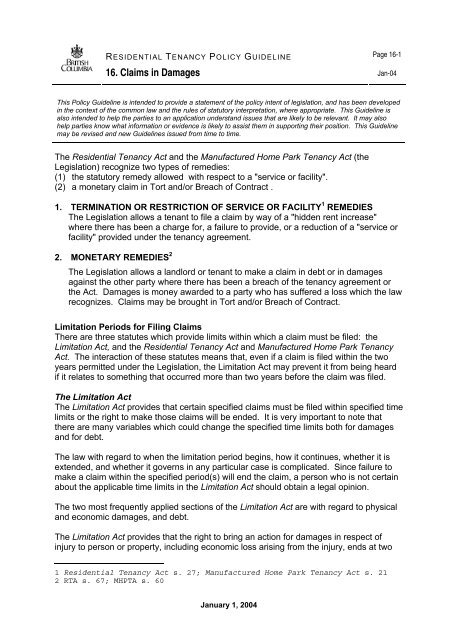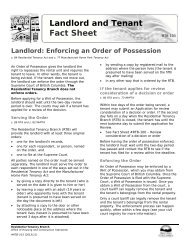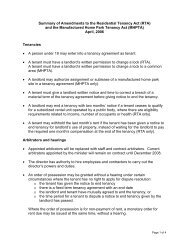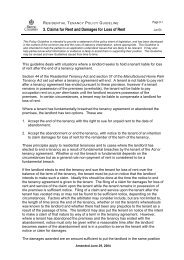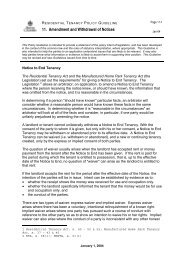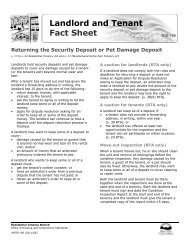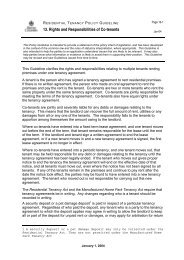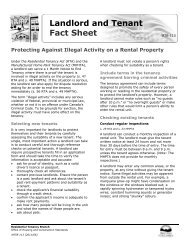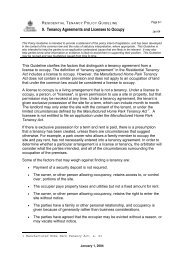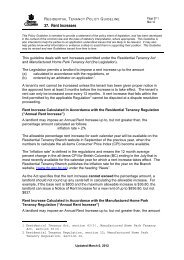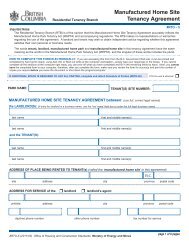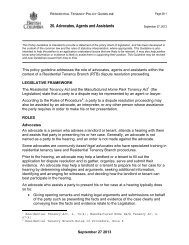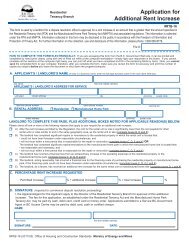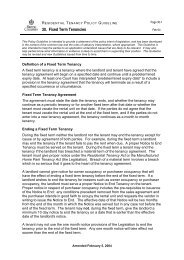Claims in Damages - Residential Tenancy Office
Claims in Damages - Residential Tenancy Office
Claims in Damages - Residential Tenancy Office
You also want an ePaper? Increase the reach of your titles
YUMPU automatically turns print PDFs into web optimized ePapers that Google loves.
RESIDENTIAL TENANCY POLICY GUIDELINE Page 16-1<br />
16. <strong>Claims</strong> <strong>in</strong> <strong>Damages</strong> Jan-04<br />
This Policy Guidel<strong>in</strong>e is <strong>in</strong>tended to provide a statement of the policy <strong>in</strong>tent of legislation, and has been developed<br />
<strong>in</strong> the context of the common law and the rules of statutory <strong>in</strong>terpretation, where appropriate. This Guidel<strong>in</strong>e is<br />
also <strong>in</strong>tended to help the parties to an application understand issues that are likely to be relevant. It may also<br />
help parties know what <strong>in</strong>formation or evidence is likely to assist them <strong>in</strong> support<strong>in</strong>g their position. This Guidel<strong>in</strong>e<br />
may be revised and new Guidel<strong>in</strong>es issued from time to time.<br />
The <strong>Residential</strong> <strong>Tenancy</strong> Act and the Manufactured Home Park <strong>Tenancy</strong> Act (the<br />
Legislation) recognize two types of remedies:<br />
(1) the statutory remedy allowed with respect to a "service or facility".<br />
(2) a monetary claim <strong>in</strong> Tort and/or Breach of Contract .<br />
1. TERMINATION OR RESTRICTION OF SERVICE OR FACILITY 1 REMEDIES<br />
The Legislation allows a tenant to file a claim by way of a "hidden rent <strong>in</strong>crease"<br />
where there has been a charge for, a failure to provide, or a reduction of a "service or<br />
facility" provided under the tenancy agreement.<br />
2. MONETARY REMEDIES 2<br />
The Legislation allows a landlord or tenant to make a claim <strong>in</strong> debt or <strong>in</strong> damages<br />
aga<strong>in</strong>st the other party where there has been a breach of the tenancy agreement or<br />
the Act. <strong>Damages</strong> is money awarded to a party who has suffered a loss which the law<br />
recognizes. <strong>Claims</strong> may be brought <strong>in</strong> Tort and/or Breach of Contract.<br />
Limitation Periods for Fil<strong>in</strong>g <strong>Claims</strong><br />
There are three statutes which provide limits with<strong>in</strong> which a claim must be filed: the<br />
Limitation Act, and the <strong>Residential</strong> <strong>Tenancy</strong> Act and Manufactured Home Park <strong>Tenancy</strong><br />
Act. The <strong>in</strong>teraction of these statutes means that, even if a claim is filed with<strong>in</strong> the two<br />
years permitted under the Legislation, the Limitation Act may prevent it from be<strong>in</strong>g heard<br />
if it relates to someth<strong>in</strong>g that occurred more than two years before the claim was filed.<br />
The Limitation Act<br />
The Limitation Act provides that certa<strong>in</strong> specified claims must be filed with<strong>in</strong> specified time<br />
limits or the right to make those claims will be ended. It is very important to note that<br />
there are many variables which could change the specified time limits both for damages<br />
and for debt.<br />
The law with regard to when the limitation period beg<strong>in</strong>s, how it cont<strong>in</strong>ues, whether it is<br />
extended, and whether it governs <strong>in</strong> any particular case is complicated. S<strong>in</strong>ce failure to<br />
make a claim with<strong>in</strong> the specified period(s) will end the claim, a person who is not certa<strong>in</strong><br />
about the applicable time limits <strong>in</strong> the Limitation Act should obta<strong>in</strong> a legal op<strong>in</strong>ion.<br />
The two most frequently applied sections of the Limitation Act are with regard to physical<br />
and economic damages, and debt.<br />
The Limitation Act provides that the right to br<strong>in</strong>g an action for damages <strong>in</strong> respect of<br />
<strong>in</strong>jury to person or property, <strong>in</strong>clud<strong>in</strong>g economic loss aris<strong>in</strong>g from the <strong>in</strong>jury, ends at two<br />
1 <strong>Residential</strong> <strong>Tenancy</strong> Act s. 27; Manufactured Home Park <strong>Tenancy</strong> Act s. 21<br />
2 RTA s. 67; MHPTA s. 60<br />
January 1, 2004
RESIDENTIAL TENANCY POLICY GUIDELINE Page 16-2<br />
16. <strong>Claims</strong> <strong>in</strong> <strong>Damages</strong> Jan-04<br />
years from the date on which the right arose, whether based on contract, tort or statutory<br />
duty.<br />
The Limitation Act provides that the right to br<strong>in</strong>g an action for most other claims,<br />
<strong>in</strong>clud<strong>in</strong>g claims <strong>in</strong> debt, ends at six years from the date on which the right arose. A<br />
person who owes a debt may, under certa<strong>in</strong> circumstances, be found to have confirmed<br />
that debt such that the limitation period for fil<strong>in</strong>g a claim <strong>in</strong> respect of that debt is<br />
extended.<br />
The Ultimate Limitation Period under the Legislation<br />
The <strong>Residential</strong> <strong>Tenancy</strong> Act and the Manufactured Home Park <strong>Tenancy</strong> Act provide that<br />
if these Acts do not state a time by which an application for arbitration must be filed, it<br />
must be filed with<strong>in</strong> 2 years of the date that the tenancy to which the matter relates ends<br />
or is assigned .3<br />
The same sections of the Legislation provide that despite the Limitation Act, if an<br />
application for arbitration is not filed with<strong>in</strong> the 2 year period, a claim aris<strong>in</strong>g under these<br />
Acts or the tenancy agreement <strong>in</strong> relation to the tenancy ceases to exist for all purposes.<br />
However, <strong>in</strong> the event that one party files for arbitration with<strong>in</strong> the limitation period and the<br />
other party has a claim which was not yet filed and which is barred by the limitation period<br />
that party may file an application for arbitration so long as it is filed before the first<br />
application is heard .4 This exception does not apply to a limitation established under the<br />
Limitation Act, however that Act has its own provisions for counterclaims.<br />
<strong>Claims</strong> <strong>in</strong> Tort<br />
A tort is a personal wrong caused either <strong>in</strong>tentionally or un<strong>in</strong>tentionally. An arbitrator may<br />
hear a claim <strong>in</strong> tort as long as it arises from a failure or obligation under the Legislationor<br />
the tenancy agreement. Failure to comply with the Legislation does not automatically<br />
give rise to a claim <strong>in</strong> tort. The Supreme Court of Canada decided that where there is a<br />
breach of a statutory duty, claims must be made under the law of negligence. In all cases<br />
the applicant must show that the respondent breached the care owed to him or her and<br />
that the loss claimed was a foreseeable result of the wrong.<br />
An arbitrator may also hear a claim where there has been a breach of the common law of<br />
landlord and tenant. These are evolv<strong>in</strong>g legal pr<strong>in</strong>ciples set out by court decisions and<br />
may, or may not, be recorded <strong>in</strong> a tenancy agreement or set out <strong>in</strong> the Legislation.<br />
<strong>Claims</strong> for Breach of Contract<br />
Prior to mak<strong>in</strong>g a claim for breach of the tenancy agreement, the Legislation permits<br />
either the landlord or the tenant to apply for arbitration for an order that the other party<br />
comply with the tenancy agreement or the Act .5 that governs the agreement.<br />
The purpose of damages is to put the person who suffered the loss <strong>in</strong> the same position<br />
as if the contract had been carried out. It is up to the person claim<strong>in</strong>g to prove that the<br />
3 RTA s. 60; MHPTA s. 53 (3)<br />
4 RTA s. 60; MHPTA s. 53 (3)<br />
5 RTA s. 55 and s. 58; MHPTA s.55 and s. 58 <br />
January 1, 2004
RESIDENTIAL TENANCY POLICY GUIDELINE Page 16-3<br />
16. <strong>Claims</strong> <strong>in</strong> <strong>Damages</strong> Jan-04<br />
other party breached the contract and that the loss resulted from the breach. The loss<br />
must be a consequence that the parties, at the time the contract was entered <strong>in</strong>to, could<br />
reasonably have expected would occur if the contract was breached. Losses that are<br />
very unexpected are normally not recoverable. The party mak<strong>in</strong>g the claim must also<br />
show that he/she took reasonable steps to ensure that the loss could not have been<br />
prevented, and is as low as reasonably possible.<br />
Where a landlord and tenant enter <strong>in</strong>to a tenancy agreement, each is expected to perform<br />
his/her part of the barga<strong>in</strong> with the other party regardless of the circumstances. A tenant<br />
is expected to pay rent. A landlord is expected to provide the premises as agreed to. If<br />
the tenant does not pay all or part of the rent, the landlord is entitled to damages. If, on<br />
the other hand, the tenant is deprived of the use of all or part of the premises through no<br />
fault of his or her own, the tenant may be entitled to damages, even where there has been<br />
no negligence on the part of the landlord. Compensation would be <strong>in</strong> the form of an<br />
abatement of rent or a monetary award for the portion of the premises or property<br />
affected.<br />
Types of <strong>Damages</strong><br />
An arbitrator may only award damages as permitted by the Legislation or the Common<br />
Law. An arbitrator can award a sum for out of pocket expenditures if proved at the<br />
hear<strong>in</strong>g and for the value of a general loss where it is not possible to place an actual<br />
value on the loss or <strong>in</strong>jury. An arbitrator may also award “nom<strong>in</strong>al damages”, which are a<br />
m<strong>in</strong>imal award. These damages may be awarded where there has been no significant<br />
loss or no significant loss has been proven, but they are an affirmation that there has<br />
been an <strong>in</strong>fraction of a legal right.<br />
In addition to other damages an arbitrator may award aggravated damages. These<br />
damages are an award, or an augmentation of an award, of compensatory damages for<br />
non-pecuniary losses. (Losses of property, money and services are considered<br />
"pecuniary" losses. Intangible losses for physical <strong>in</strong>convenience and discomfort, pa<strong>in</strong> and<br />
suffer<strong>in</strong>g, grief, humiliation, loss of self-confidence, loss of amenities, mental distress, etc.<br />
are considered "non-pecuniary" losses.) Aggravated damages are designed to<br />
compensate the person wronged, for aggravation to the <strong>in</strong>jury caused by the wrongdoer's<br />
willful or reckless <strong>in</strong>different behaviour. They are measured by the wronged person's<br />
suffer<strong>in</strong>g.<br />
• The damage must be caused by the deliberate or negligent act or omission of the<br />
wrongdoer.<br />
• The damage must also be of the type that the wrongdoer should reasonably have<br />
foreseen <strong>in</strong> tort cases, or <strong>in</strong> contract cases, that the parties had <strong>in</strong> contemplation at the<br />
time they entered <strong>in</strong>to the contract that the breach compla<strong>in</strong>ed of would cause the<br />
distress claimed.<br />
• They must also be sufficiently significant <strong>in</strong> depth, or duration, or both, that they<br />
represent a significant <strong>in</strong>fluence on the wronged person's life.<br />
They are awarded where the person wronged cannot be fully compensated by an<br />
award for pecuniary losses. Aggravated damages are rarely awarded and must<br />
January 1, 2004
RESIDENTIAL TENANCY POLICY GUIDELINE Page 16-4<br />
16. <strong>Claims</strong> <strong>in</strong> <strong>Damages</strong> Jan-04<br />
specifically be sought.<br />
An arbitrator does not have the authority to award punitive damages, to punish the<br />
respondent.<br />
Criteria Considered When Award<strong>in</strong>g <strong>Damages</strong><br />
If a claim is made by the tenant for loss of quiet enjoyment, the arbitrator may consider<br />
the follow<strong>in</strong>g criteria <strong>in</strong> determ<strong>in</strong><strong>in</strong>g the amount of damages:<br />
• the amount of disruption suffered by the tenant.<br />
• the reason for the disruption.<br />
• if there was any benefit to the tenant for the disruption.<br />
• whether or not the landlord made his or her best efforts to m<strong>in</strong>imize any<br />
disruptions to the tenant.<br />
If a claim is made by a tenant for damages for breach of the abandonment regulations by<br />
the landlord the normal measure of damages is the market value of the lost articles, i.e.<br />
the price of a similar item <strong>in</strong> the market. The price of a similar item <strong>in</strong> the market must<br />
<strong>in</strong>clude reference to its condition at the time of its loss. For items, such as photographs,<br />
which may have limited market value but great sentimental value to the tenant, an<br />
arbitrator may consider the size and scope of the collection and the <strong>in</strong>tr<strong>in</strong>sic value to the<br />
tenant.<br />
If a claim is made by the landlord for damage to property the normal measure of damage<br />
is the cost of repairs, with some allowance for loss of rent or occupation dur<strong>in</strong>g repair, or<br />
replacement (less depreciation), which ever is less. The onus is on the tenant to show<br />
that the expenditure is unreasonable.<br />
January 1, 2004


